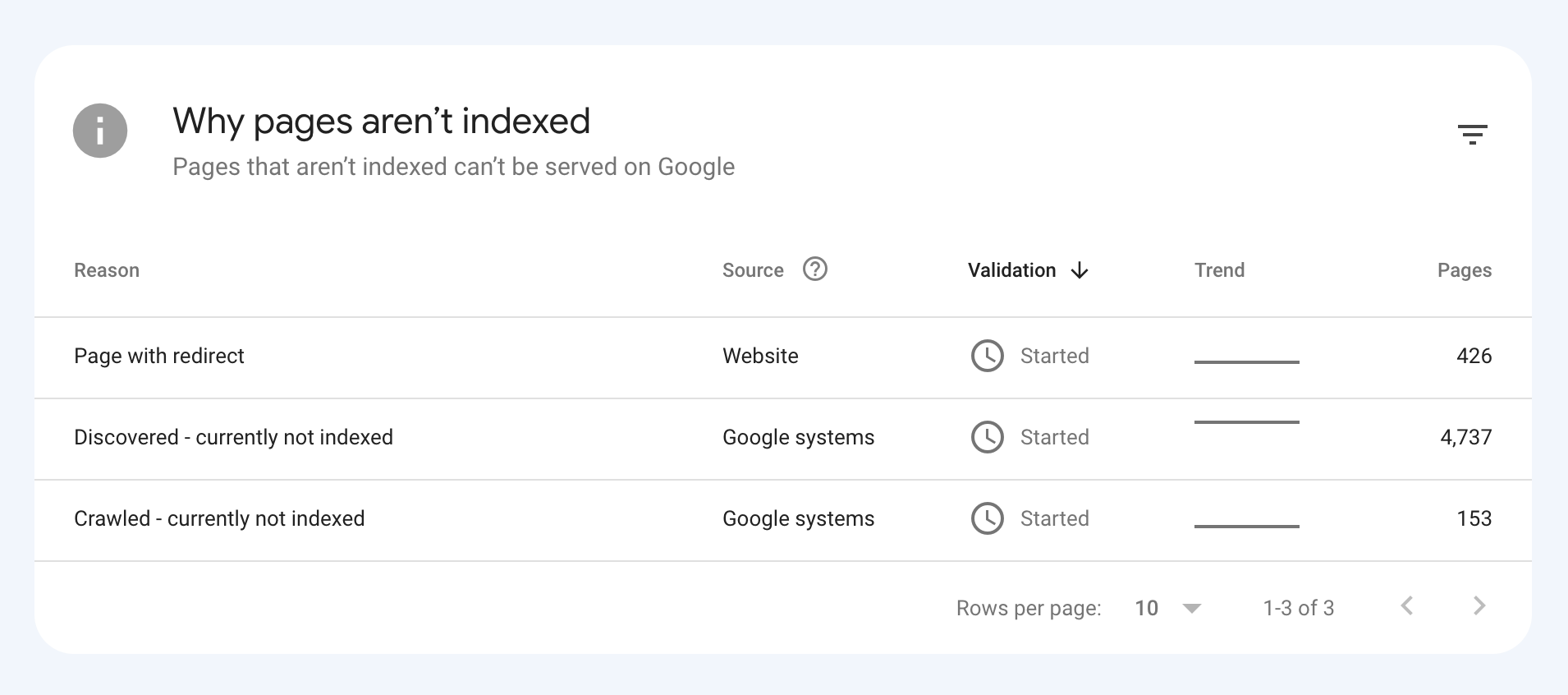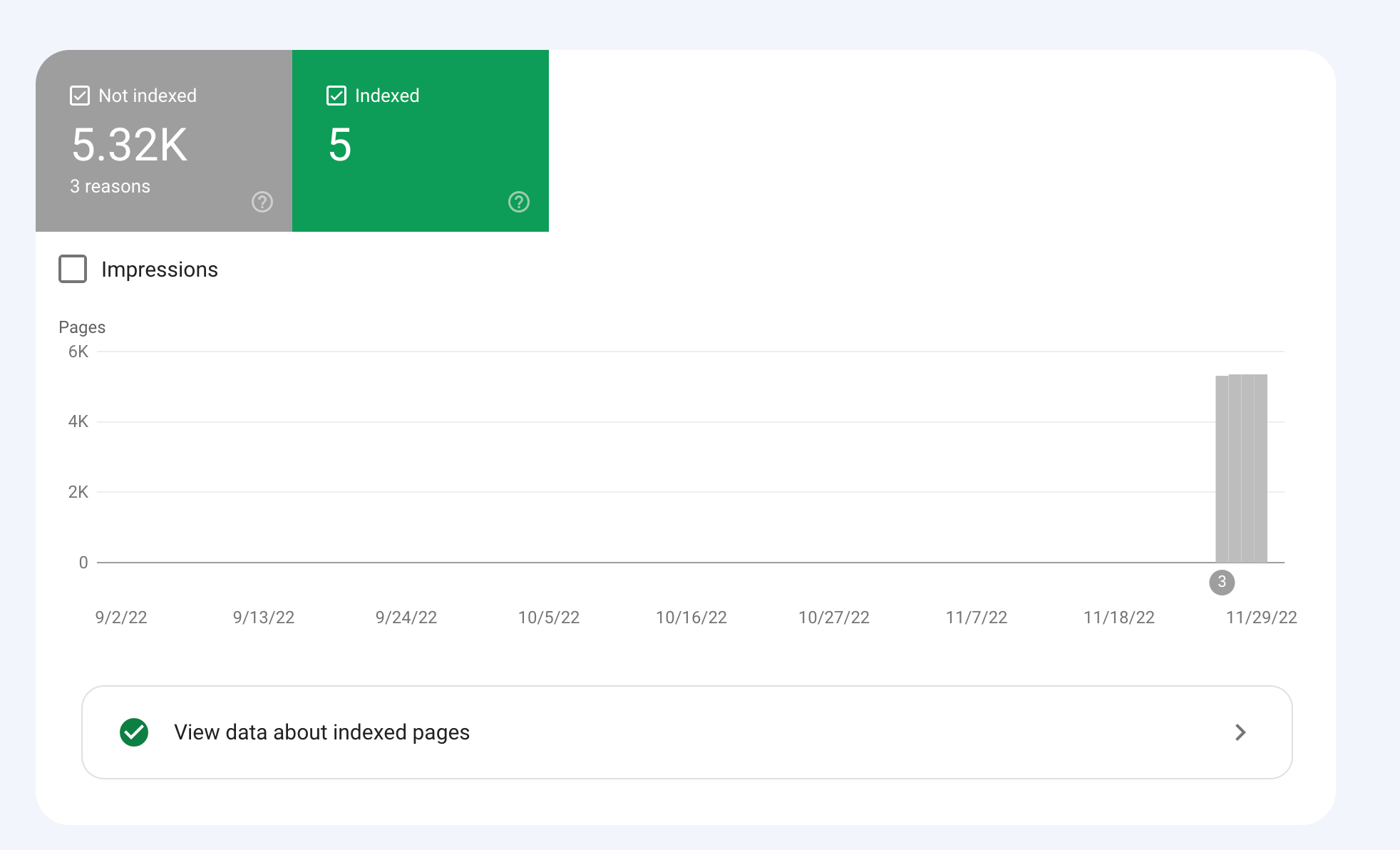Moz Q&A is closed.
After more than 13 years, and tens of thousands of questions, Moz Q&A closed on 12th December 2024. Whilst we’re not completely removing the content - many posts will still be possible to view - we have locked both new posts and new replies. More details here.
How to index e-commerce marketplace product pages
-
Hello!
We are an online marketplace that submitted our sitemap through Google Search Console 2 weeks ago. Although the sitemap has been submitted successfully, out of ~10000 links (we have ~10000 product pages), we only have 25 that have been indexed.
I've attached images of the reasons given for not indexing the platform.


How would we go about fixing this?
-
To get your e-commerce marketplace product pages indexed, make sure your pages include unique and descriptive titles, meta descriptions, relevant keywords, and high-quality images. Additionally, optimize your URLs, leverage schema markup, and prioritize user experience for increased search engine visibility.
-
@fbcosta i hve this problem but its so less in my site
پوشاک پاپیون -
I'd appreciate if someone who faced the same indexing issue comes forward and share the case study with fellow members. Pin points steps a sufferer should do to overcome indexing dilemma. What actionable steps to do to enable quick product indexing? How we can get Google's attention so it can start indexing pages at a quick pace? Actionable advice please.
-
There could be several reasons why only 25 out of approximately 10,000 links have been indexed by Google, despite successfully submitting your sitemap through Google Search Console:
Timing: It is not uncommon for indexing to take some time, especially for larger sites with many pages. Although your sitemap has been submitted, it may take several days or even weeks for Google to crawl and index all of your pages. It's worth noting that not all pages on a site may be considered important or relevant enough to be indexed by Google.
Quality of Content: Google may not index pages that it considers low-quality, thin or duplicate content. If a significant number of your product pages have similar or duplicate content, they may not be indexed. To avoid this issue, make sure your product pages have unique, high-quality content that provides value to users.
Technical issues: Your site may have technical issues that are preventing Google from crawling and indexing your pages. These issues could include problems with your site's architecture, duplicate content, or other issues that may impact crawling and indexing.
Inaccurate Sitemap: There is also a possibility that there are errors in the sitemap you submitted to Google. Check the sitemap to ensure that all the URLs are valid, the sitemap is up to date and correctly formatted.
To troubleshoot this issue, you can check your site's coverage report on Google Search Console, which will show you which pages have been indexed and which ones haven't. You can also check your site's crawl report to see if there are any technical issues that may be preventing Google from crawling your pages. Finally, you can also run a site audit to identify and fix any technical issues that may be impacting indexing.
-
@fbcosta As per my experience, if your site is new it will take some time to index all of the URLs, and the second thing is, if you have Hundreds of URLs, it doesn't mean Google will index all of them.
You can try these steps which will help in fast indexing:
- Sharing on Social Media
- Interlinking from already indexed Pages
- Sitemap
- Share the link on the verified Google My Business Profile (Best way to index fast). You can add by-products or create a post and link it to the website.
- Guest post
I am writing here for the first time, I hope it will help

Got a burning SEO question?
Subscribe to Moz Pro to gain full access to Q&A, answer questions, and ask your own.
Browse Questions
Explore more categories
-
Moz Tools
Chat with the community about the Moz tools.
-
SEO Tactics
Discuss the SEO process with fellow marketers
-
Community
Discuss industry events, jobs, and news!
-
Digital Marketing
Chat about tactics outside of SEO
-
Research & Trends
Dive into research and trends in the search industry.
-
Support
Connect on product support and feature requests.
Related Questions
-
GoogleBot still crawling HTTP/1.1 years after website moved to HTTP/2
Whole website moved to https://www. HTTP/2 version 3 years ago. When we review log files, it is clear that - for the home page - GoogleBot continues to only access via HTTP/1.1 protocol Robots file is correct (simply allowing all and referring to https://www. sitemap Sitemap is referencing https://www. pages including homepage Hosting provider has confirmed server is correctly configured to support HTTP/2 and provided evidence of accessing via HTTP/2 working 301 redirects set up for non-secure and non-www versions of website all to https://www. version Not using a CDN or proxy GSC reports home page as correctly indexed (with https://www. version canonicalised) but does still have the non-secure version of website as the referring page in the Discovery section. GSC also reports homepage as being crawled every day or so. Totally understand it can take time to update index, but we are at a complete loss to understand why GoogleBot continues to only go through HTTP/1.1 version not 2 Possibly related issue - and of course what is causing concern - is that new pages of site seem to index and perform well in SERP ... except home page. This never makes it to page 1 (other than for brand name) despite rating multiples higher in terms of content, speed etc than other pages which still get indexed in preference to home page. Any thoughts, further tests, ideas, direction or anything will be much appreciated!
Technical SEO | | AKCAC1 -
Customer Reviews on Product Page / Pagination / Crawl 3 review pages only
Hi experts, I present customer feedback, reviews basically, on my website for the products that are sold. And with this comes the ability to read reviews and obviously with pagination to display the available reviews. Now I want users to be able to flick through and read the reviews to help them satisfy whatever curiosity they have. My only thinking is that the page that contains the reviews, with each click of the pagination will present roughly the same content. The only thing that changes is the title tags which will contain the number in the H1 to display the page number. I'm thinking this could be duplication but i have yet to be notified by Google in my Search console... Should i block crawlers from crawling beyond page 3 of reviews? Thanks
Technical SEO | | Train4Academy.co.uk0 -
Unsolved Is Performance Metrics only available in a Campaign?
I'm looking to do a 1-off Performance Metrics analysis across dozens of pages on a single website - a prospective client. I thought it would be part of the On-Demand Crawl.
Moz Tools | | amandacash858961 -
Unsolved Duplicate LocalBusiness Schema Markup
Hello! I've been having a hard time finding an answer to this specific question so I figured I'd drop it here. I always add custom LocalBusiness markup to clients' homepages, but sometimes the client's website provider will include their own automated LocalBusiness markup. The codes I create often include more information. Assuming the website provider is unwilling to remove their markup, is it a bad idea to include my code as well? It seems like it could potentially be read as spammy by Google. Do the pros of having more detailed markup outweigh that potential negative impact?
Local Website Optimization | | GoogleAlgoServant0 -
Keywords are indexed on the home page
Hello everyone, For one of our websites, we have optimized for many keywords. However, it seems that every keyword is indexed on the home page, and thus not ranked properly. This occurs only on one of our many websites. I am wondering if anyone knows the cause of this issue, and how to solve it. Thank you.
Technical SEO | | Ginovdw1 -
Is it good to redirect million of pages on a single page?
My site has 10 lakh approx. genuine urls. But due to some unidentified bugs site has created irrelevant urls 10 million approx. Since we don’t know the origin of these non-relevant links, we want to redirect or remove all these urls. Please suggest is it good to redirect such a high number urls to home page or to throw 404 for these pages. Or any other suggestions to solve this issue.
Technical SEO | | vivekrathore0 -
Should I put meta descriptions on pages that are not indexed?
I have multiple pages that I do not want to be indexed (and they are currently not indexed, so that's great). They don't have meta descriptions on them and I'm wondering if it's worth my time to go in and insert them, since they should hypothetically never be shown. Does anyone have any experience with this? Thanks! The reason this is a question is because one member of our team was linking to this page through Facebook to send people to it and noticed random text on the page being pulled in as the description.
Technical SEO | | Viewpoints0 -
Unnecessary pages getting indexed in Google for my blog
I have a blog dapazze.com and I am suffering from a problem for a long time. I found out that Google have indexed hundreds of replytocom links and images attachment pages for my blog. I had to remove these pages manually using the URL removal tool. I had used "Disallow: ?replytocom" in my robots.txt, but Google disobeyed it. After that, I removed the parameter from my blog completely using the SEO by Yoast plugin. But now I see that Google has again started indexing these links even after they are not present in my blog (I use #comment). Google have also indexed many of my admin and plugin pages, whereas they are disallowed in my robots.txt file. Have a look at my robots.txt file here: http://dapazze.com/robots.txt Please help me out to solve this problem permanently?
Technical SEO | | rahulchowdhury0